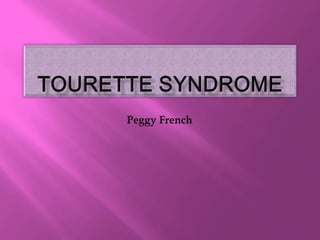
Power Point Presentation On Tourette
- 1. Tourette Syndrome Peggy French
- 2. Golden Rule “Do unto others as you would have them do unto you.” 2 Tourette Syndrome
- 3. Tourette Syndrome 3 What is Tourette Syndrome? Tourette Syndrome is a neurological disorder characterized by tics-involuntary, rapid movements and/or vocal outbursts that occur repeatedly. The first case of Tourette Syndrome was diagnosed in 1825 by a French Physician and neurologist, Georges Gilles de la Tourette.
- 4. Diagnosis Tourette Syndrome 4 For Tourette Syndrome to be diagnosed, multiple motor tics and at least 1 vocal tic must be present over a period of 12 months, without a break of more than 3 months. MotorVocal blinking barking smelling grunting shoulder shrugs meaningless shouts jumping repeating words
- 5. What? and When? Tourette Syndrome 5
- 10. We are the same! 8 Tourette Syndrome
- 11. What can we do? Tourette Syndrome 9 Educate our youth. Combat prejudice. Open discussions with others about Tourette. Speak up when others are being treated unfairly. Treat individuals with Tourette with respect. Become involved.
- 12. Tourette Syndrome 10 For more information contact: Tourette Syndrome Association, Inc. 42-40 Bell Boulevard Bayside, NY 11361 718-224-2999 www.tsa-usa.org www.tsa-usa.org/teamtsa
Notas do Editor
- Intro: Good morning, my name is … Thank you for joining me today for my presentation on Tourette Syndrome.
- First, I would like to start with a quote that I believe covers a wide range of topics. (read quote) No matter what field we are in it is inevitable that we will run into someone who has a disability and we need to know how to handle these situations. Sometimes,we don’t feel comfortable around people with disabilities and we react different than we normally would. For example: If we were to see a person in a wheel chair, we automatically move to give them room or some people would tend to not directly look at them. We rarely wonder what they are feeling. If we picture ourselves in their situation it can help us understand what they are going through. Today, I am going to discuss the topic of Tourette Syndrome, what it is, what other medical conditions are related, and what possible medications doctors use to treat TS. Hopefully, by the end of this presentation you will leave with a better understanding of what TS is and how it affects those stricken with this disorder.
- Explain tourette and who founded it. Many of the individuals that were first diagnosed with TS were thought to have had some type of mental disorder.
- Explain the criteria for TS and describe the different tics, also keeping in mind that many times there are more than one tic present. Also, include the meaning for coprolalia—involuntary swearing—only 10% of individuals with TS have it.
- Explain that these different disorders and characteristics can all be present at the same time in a person with TS. Notice that the age for ADHD is 3 ½ years old. The age difference make it very hard to clearly diagnose ADHD and OCD in TS patents because most kids are full of energy and the onset of OCD is right around the same time as the motor and vocal tics therefore, the tics take precedence over the OCD.
- Describe the possible medication and some of the side effects which can take place such as, lethargy, sleepiness, hyperactivity, make tics worse, and not have any effect at all. Many people with TS feel hopeless because of the fact that many of the medications do not help or can actually make the tics worse depending on the person.
- Explain the different facts about tourette. Many do not have any learning disabilities although, some have writing and attention problems.
- Explain that those with TS want to be treated the same as everyone else. Just like the person in the wheelchair wants to be seen by us as a person who is normal, just like we are, as if they are not sitting in the wheelchair. A person with TS wants only to be seen as a person who experiences the same highs and lows as we do. Watch video, and/or explain James’ personal background including OCD and how it has effected him and his siblings. Include the fact his grandmother was undiagnosed with TS (blinking), she used to get yelled at all the time for it. Include the “scratching the itch” story from his 4th grade class experience. In addition, include the fact that because of social out casting many individuals with TS are at higher risk for depression and anxiety issues, including suicide.
- Explain the different ways we can help. Along with the last suggestion, include the part about the program TeamTSA, which is a official event across the nation where people get businesses to sponsor them and they have walks to raise awareness and funds for research, much like the cancer walks.
- If they would like to learn more about TS--give information about TSA and explain that another way they can get involved is to become a member of TSA. Explain the last web address is for anyone who is interested in learning more about the TeamTSA fund raiser awareness program. Conclusion:Thank you for allowing me to share this presentation. I hope that you walk away today having a better understanding of Tourette Syndrome. Please remember when you see someone with TS, try to remember that this is a neurological disorder, it cannot be suppressed anymore than you can stop scratching a mosquito bite and that on the inside they are just the same as you and me. Does anyone have any questions they would like to ask? Thank you.